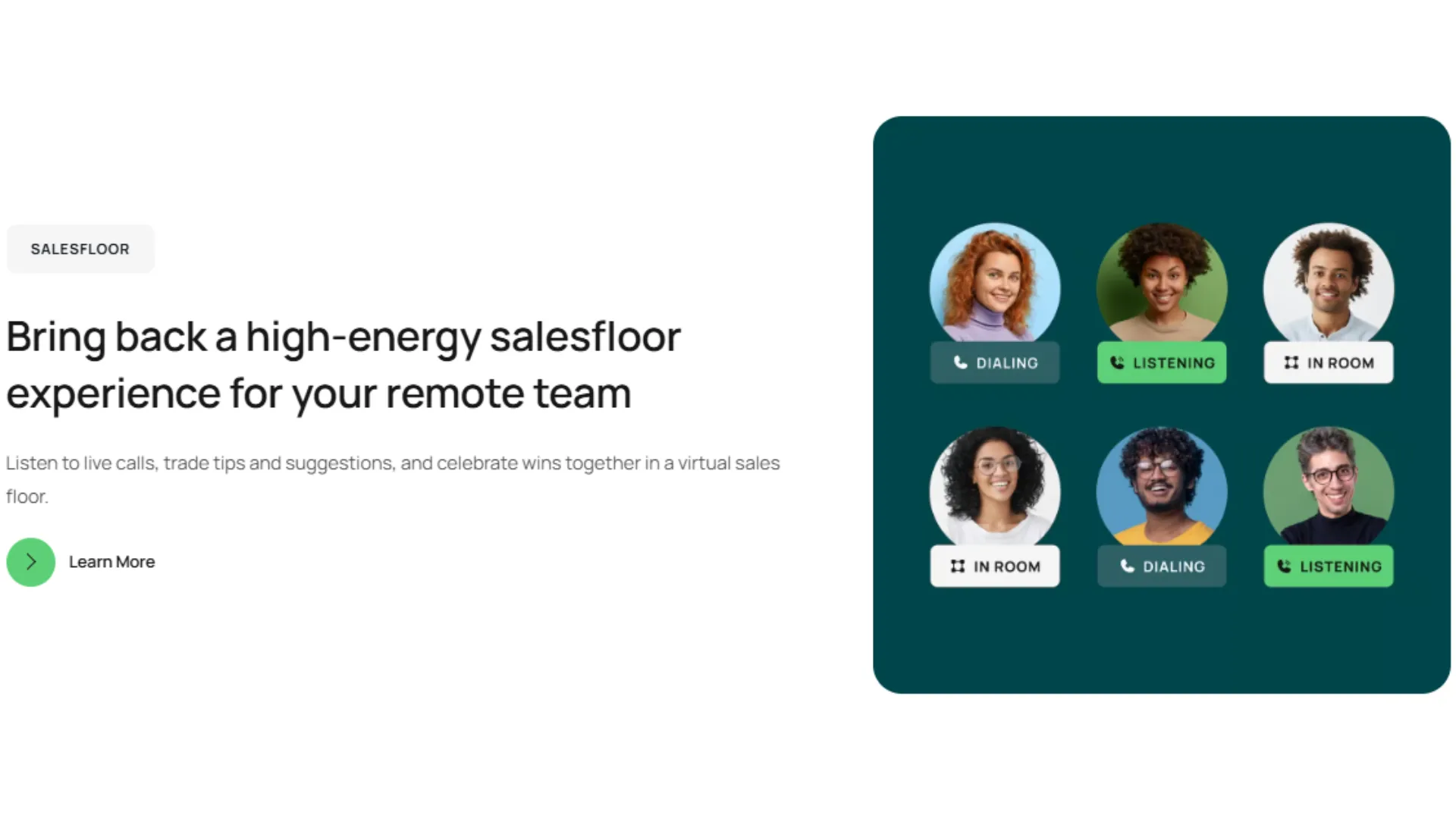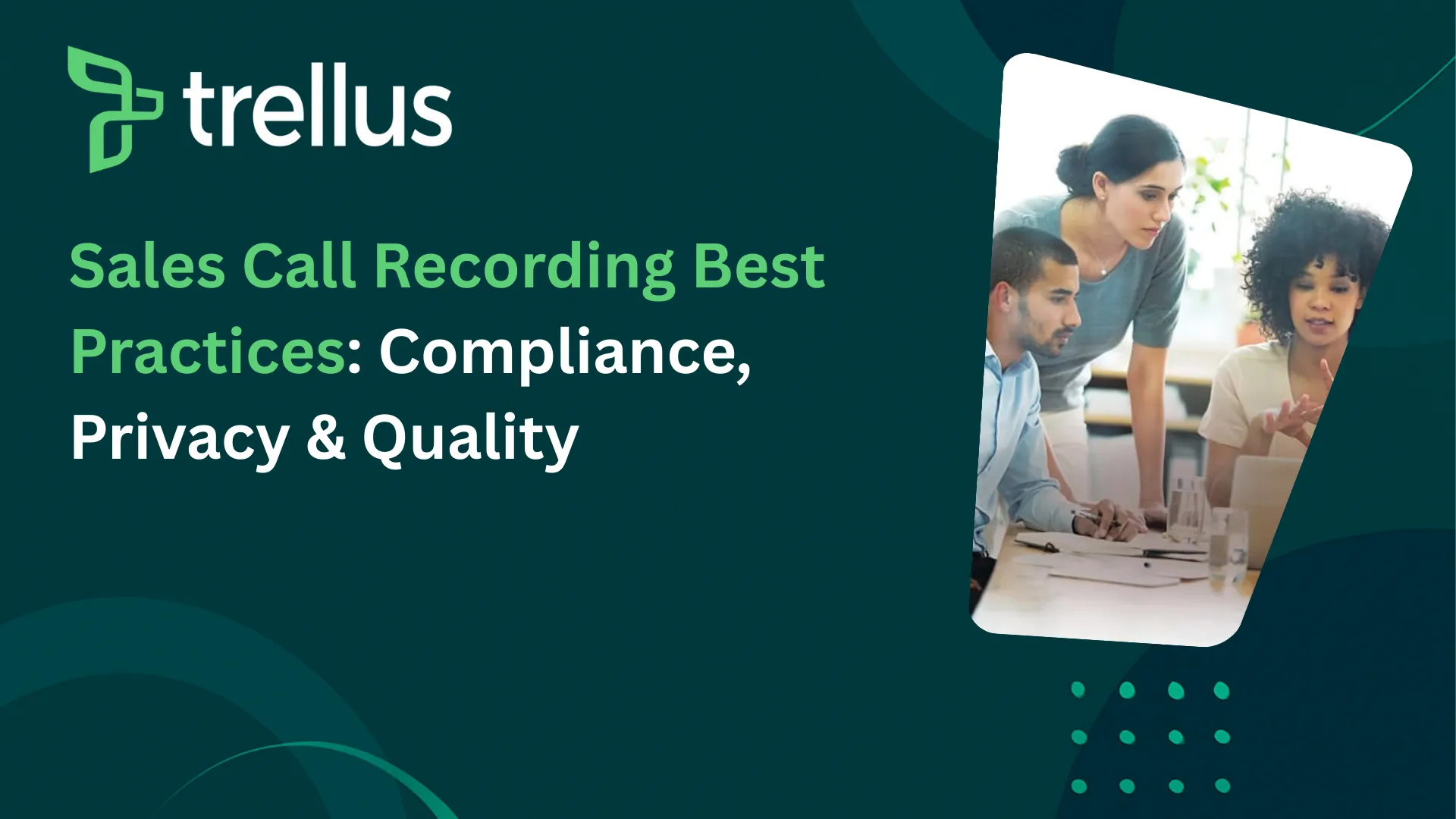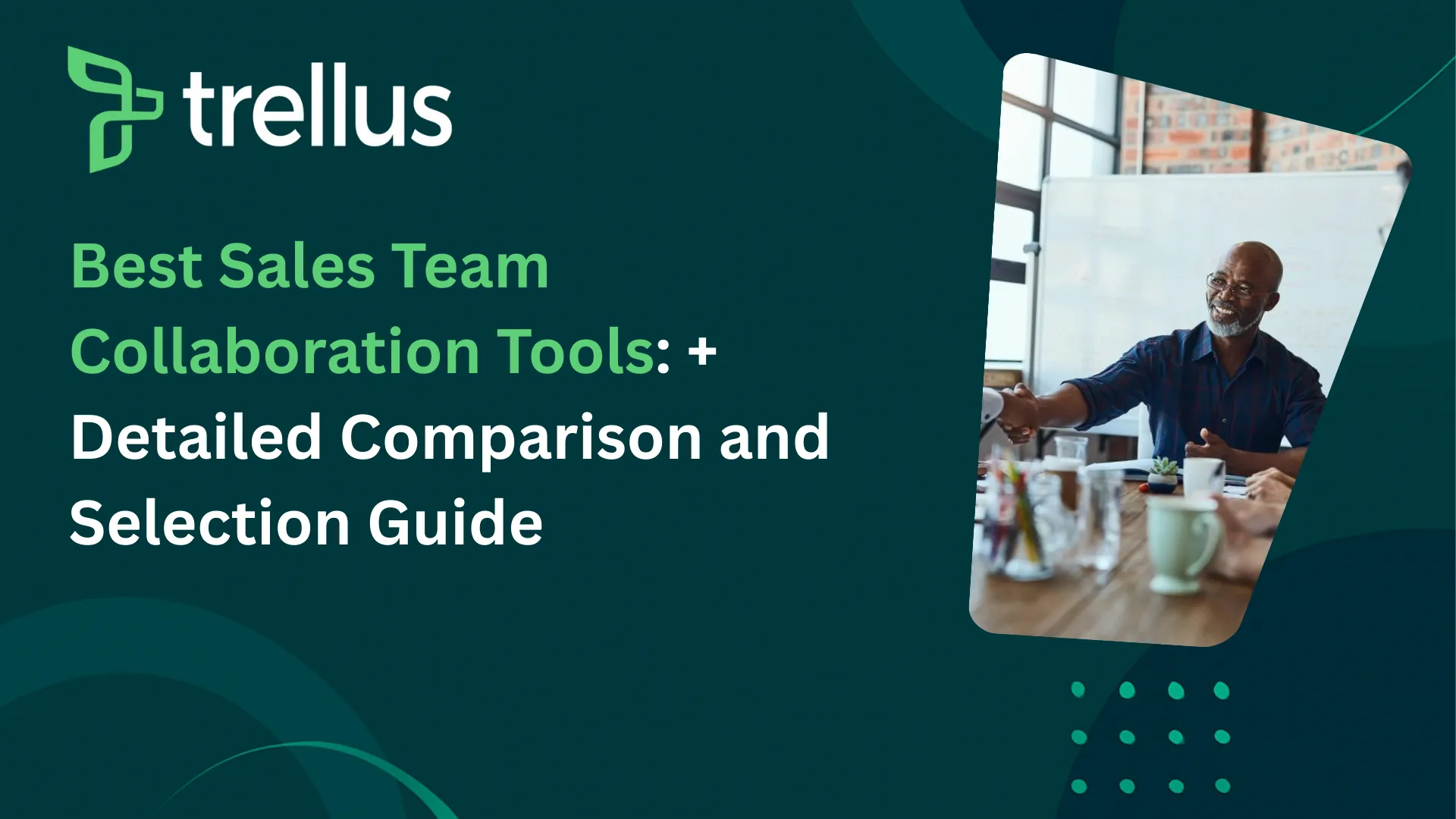
Our Top Picks


Hello there, everyone.
This week’s message from Trellus might surprise you—maybe even seem a little counterintuitive.
We’re talking about the unexpected connections between sales, sales management, and enablement.
More importantly, all three of the aforementioned traits, or aspects of sales, have a symbiotic relationship that experts like to label as: Parallel Sales.
And yes, there’s a software platform called: Parallel, but the stuff we are talking about has nothing to do with driving sales through that platform.
The reason we wanted to mention the bleak difference, highlighting Parallel software and the Parallel Sales phenomenon, is because if you were to search for Parallel Sales, Google will most likely show you the company’s website and how they create a framework and templates to do things around their value offerings. Hence, you’d be deviated off topic by a long shot.
Coming back to the point, when we talk about Parallel Sales, there’s a lot that goes into it.
As always, we’ll break it down in a way that’s practical, relatable, and—most importantly—useful.
Parallel Sales Myth: Different Roles That Drive Sales and Performance Enablement

Parallel sales is a phenomenon that enables sales teams, at multiple levels, to drive more sales and conversions, using different tactics, technologies and techniques.
All of this is done in parallel to one another - hence the expression: parallel sales is used.
To think of it, the term: parallel dialer will probably come to your mind because it has a lot of similarities with parallel sales strategies. The good news is that parallel dialers are part of the ecosystem, and so are progressive dialers.
But since this topic is leaning on the “parallel” side of things, we’ll get into parallel dialing tools and software later in this post.
Moving on, salespeople, sales managers, and enablement leaders—each has its own reputation. Top-performing reps have their unique strengths, just like great managers and enablement pros. But here’s the thing about parallel sales: the best in each role share some core skills and mindsets.
Also Read: 8 Best Parallel Dialer(s) For Effective Cold Calling
We’ve all seen it happen—a superstar rep gets promoted to manager, and suddenly, they struggle. Or a manager moves into enablement and finds the transition tougher than expected. The usual argument is that these roles require completely different skill sets, so promoting without retraining is a recipe for failure.
But what if we’re overcomplicating it? What if the key to success in any of these roles lies in recognizing the parallel sales skills that already exist?
The Big Misconception About Enablement
Some believe enablement is all about processes, tools, and training, while sales is more or less about execution.
That’s an oversimplification.
While it’s true that as part of the parallel sales strategies, the sales enablement side of things focuses on optimizing performance, but the best enablers think like sellers. They diagnose problems, design solutions, and influence behavior—just like a great sales rep or manager would.
Does that mean every enabler must have been a top seller?
In essence, not necessarily.
But they do need to deeply understand how sales works—how deals move, what blockers reps face, and how to fix them.
The Core Competencies of Parallel Sales That Span All Three Roles

Sales, sales management, and enablement might seem like totally different worlds, but they’re more connected than most people realize.
The best in each role share a set of core skills—what we call parallel sales competencies. These are the abilities that translate across all three jobs, just applied in slightly different ways.
And here’s the kicker—if you master these, you won’t just sell better. You’ll manage better. You’ll enable better.
And if you’re using tools like a progressive dialer, or a parallel dialer, you’ll turn those skills into serious efficiency.
We recommend using a parallel dialer because even though a progressive dialer calls prospects automatically, all of it is done on a single line dialing mode.
So, if your business requires you to bring in more sales, waste less time and connect with multiple prospects simultaneously, parallel is the way to go.
But, with that being said, parallel dialers are a little more expensive as compared to single line progressive dialers. Therefore, Trellus offers the best of both worlds!
Parallel Sales Mastery Unlocked With Trellus: The No.1 Parallel Dialing Software Online

As part of the parallel sales eco-system, we initially took off as a robust auto dialer, alongside a unique a.i. powered live coaching system.
On top of that, the platform's integrations with Apollo, SalesLoft, Hubspot and many other popular CRMs make it a go-to solution for multi-sized sales oriented businesses.
We recently introduced parallel dialing as part of popular ongoing demand to help medium to large sized businesses scale their sales workflow, and many other requirements that aren't easy to fulfill on single line dialing mode.
Apart from that, Trellus is a super-lightweight tool that can be installed as a simple Google Chrome extension, making it a perfect fit for your organization's existing workflow. Managers can access team based analytics and conversational intelligence data any time through a dedicated diagnostic panel.
Everything in Trellus is designed from a ground-up approach to enhance sales teams’ productivity through multiple simultaneous outbound calls, and planety of different features.
Top it all off with highly affordable pricing plans, and you're practically looking at a solution that cuts the competition through features, affordability and future proofing - all in one small package.
Key Features of Trellus Parallel Dialer

- Parallel Dialing: Enables users to dial multiple prospects simultaneously, ensuring that sales reps spend more time in conversations and less time waiting.
- CRM Integration: Seamlessly integrates with major CRMs like HubSpot, Salesloft, and HubSpot, syncing call data automatically.
- Voicemail Drop: Allows reps to leave pre-recorded voicemails instantly, saving time and ensuring consistent messaging.
- Call Recording & Analytics: Provides detailed call metrics, including call duration, connection rates, and agent performance.
- AI Powered Live Coaching: Enables sales managers to listen to live calls and provide real-time coaching without the prospect hearing.
- Single Line Auto Dialing: Helps sales teams schedule callbacks and follow-ups within the CRM for better lead management.
Trellus Pricing Plans
Our sales dialer solution offers multiple pricing tiers to accommodate businesses of different sizes.
Power Plan: Starting at $59.99/month
- Unlimited single line dialing
- VM drop on select platforms (VM drop only available on Outreach, Salesloft, and Apollo)
- Access to past transcripts
- Superhuman for LinkedIn
Business Plan: Starting at $149.99 for larger sales teams. Coimes with:
- Unlimited multi line dialing
- VM drop on all platforms
- Unlimited AI practice calls
- 5 additional phone numbers + spam remediation
Moving on, let’s break down the six key skills that make parallel sales work—and how they apply whether you’re closing deals, leading a team, or optimizing the whole sales machine.
1. Discovery & Diagnostic Skills: The Art of Asking the Right Questions
For Sellers: Uncovering What Buyers Really Need
Great salespeople don’t just pitch—they dig deep.
They ask questions that reveal the real pain points, not just surface-level complaints. The best reps act like consultants, diagnosing problems before jumping to solutions.
Think about it: if you’re selling software, you don’t just ask, “Do you need a CRM?” You ask, “What’s slowing your team down right now?” or “Where are deals getting stuck in your pipeline?” That’s how you move from selling features to solving problems.
For Managers: Fixing What’s Really Broken
Managers use the same skill—just on their team.
If a rep is missing quota, the worst thing you can do is assume it’s a motivation problem. Maybe they’re struggling with objection handling. Maybe their lead quality is trash. The best managers diagnose before they prescribe.
For Enablement: Solving Systemic Issues
Enablement takes this to the next level. Instead of fixing one rep, they look at patterns.
Are most reps struggling at the same stage? Is there a knowledge gap across the team? They’re like sales detectives, finding the root cause so they can build training, playbooks, or process fixes that actually work.
Why This Matters for Efficiency?
- Better discovery = fewer wasted calls.
- Faster diagnosis = quicker fixes.
- If you’re using a progressive dialer, this skill ensures you’re only talking to leads who actually need what you sell.
2. Problem-Solving & Solution Design: Building the Right Fix
For Sellers: Co-Creating the Answer
The best salespeople don’t just drop a solution in the buyer’s lap—they involve them in shaping it.
When buyers feel like they helped design the fix, they’re way more likely to commit.
Example: Instead of saying, “Here’s our pricing package,” you say, “Based on what you told me, Option A saves you time, but Option B cuts costs. Which one feels right?”
For Managers: Tailoring the Fix to the Rep
Managers do the same thing with their team.
A struggling rep might need more training—or maybe they just need better leads. The best managers don’t apply one-size-fits-all fixes. They work with the rep to build a plan that actually sticks.
For Enablement: Scaling What Works
Enablement pros take the best fixes and make them repeatable. If one rep cracks the code on handling a common objection, they turn that into training for everyone. They’re the architects of scalable success.
Why This Matters for Efficiency?
- Faster problem-solving = shorter sales cycles.
- Better solutions = higher win rates.
- A progressive dialer gets you in front of more leads—but this skill makes sure those conversations actually go somewhere.
3. Ethical Influence & Persuasion: Getting Buy-In Without BS
For Sellers: Aligning Solutions to Needs
Nobody likes a pushy salesperson. The best reps persuade by showing how their solution fits the buyer’s world—not by pressuring them.
Example: Instead of “You need to buy now!” it’s “If we solve this now, you’ll save X hours per week. If we wait, the problem keeps costing you.”
For Managers: Coaching, Not Commanding
Great managers don’t just tell reps what to do—they help them see why it matters. Instead of “Call more leads,” it’s “If you hit 20% more calls, you’ll hit quota even with your current close rate.”
For Enablement: Selling Change to the Org
Enablement isn’t just about rolling out new tools—it’s about getting reps and leaders to actually use them. The best enablers frame changes in terms of real impact: “This new process cuts admin time by 30%—that’s 10 more calls per rep per day.”
Why This Matters for Efficiency?
- Ethical persuasion = faster decisions.
- Clear value = less resistance.
- A progressive dialer helps you reach more people—but persuasion turns those calls into wins.
4. Communication Skills: Adapting to Every Situation
For Sellers: One Message Doesn’t Fit All
The best reps tweak their pitch for every buyer and channel. An email is different from a cold call. A CFO cares about ROI; a frontline manager cares about ease of use.
For Managers: Feedback That Lands
Great managers don’t just give feedback—they tailor it. Some reps need direct critique; others need encouragement. The best adjust on the fly.
For Enablement: Making Training Stick
Enablement pros know that boring slides don’t change behavior. They use stories, examples, and interactive sessions so reps actually remember and apply what they learn.
Why This Matters for Efficiency?
- Clearer communication = fewer misunderstandings.
- Better messaging = faster conversions.
- A progressive dialer gets you more conversations—but sharp communication makes them count.
5. Negotiation Skills: Knowing When to Hold Firm and When to Bend
For Sellers: Negotiating After Selling
Bad reps lead with discounts. Good reps sell value first, then negotiate terms. If the buyer sees the ROI, price matters less.
For Managers: Getting Reps to Commit
Managers negotiate too—just with their team. “If you hit X calls, I’ll get you Y support.” It’s about trade-offs, not demands.
For Enablement: Fighting for Resources
Enablement pros negotiate for budget, time, and priority. They don’t just ask—they prove why their project deserves attention.
Why This Matters for Efficiency?
- Stronger negotiation = better deals.
- Clear agreements = faster execution.
- A progressive dialer speeds up outreach—but negotiation skills close the deal.
6. Business Acumen: Speaking the Language of Decision-Makers
For Sellers: Connecting Solutions to Business Impact
Top reps don’t just talk features—they tie solutions to revenue, costs, or efficiency. They know how budgets work, how decisions get made, and what metrics matter to the buyer.
For Managers: Coaching Reps on Strategy
Great managers help reps see the bigger picture. “This isn’t just a discount request—it’s a test of how much they value the solution.”
For Enablement: Aligning with Company Goals
Enablement doesn’t build training in a vacuum. They tie everything to revenue growth, retention, or other key outcomes.
Why This Matters for Efficiency?
- Stronger business cases = faster approvals.
- Clearer priorities = better focus.
- A progressive dialer helps you reach more leads—but business acumen helps you sell to the right ones.
The 6 Traits That Fuel Success in Any Role
Skills matter, but mindset is just as crucial.
Here’s what the best in sales, management, and enablement that everyone shares directly, or indirectly:
- Curiosity – A hunger to understand people and problems deeply.
- Empathy – Seeing things from others’ perspectives—buyers, reps, or stakeholders.
- Drive – The relentless push to improve and win.
- Coachability – A growth mindset that welcomes feedback.
- Figure-It-Out Factor – The ability to adapt and solve problems without hand-holding.
- Resilience (Grit) – Pushing through setbacks without burning out.
How This Helps You Call More Leads in Less Time
You might be wondering—what does this have to do with calling more leads in less time?
You might be surprised but the answer is quite simple:
- Better discovery means fewer wasted calls—you know exactly who to target and why.
- Stronger problem-solving helps you overcome objections faster.
- Sharper communication keeps conversations concise and impactful.
- Faster negotiation moves deals forward without unnecessary back-and-forth.
And if you’re using tools like a progressive dialer, these skills amplify your efficiency. A dialer gets you in front of more leads—but parallel sales skills ensure those conversations actually convert.
The Bottom Line
Instead of treating sales, management, and enablement as entirely separate worlds, we should focus on the parallel sales skills that make someone great in any of these roles.
When promoting or hiring, look for these core competencies and traits. Then, bridge the gaps with training and coaching. The best leaders don’t just throw people into new roles—they prepare them first.
Despite your ongoing efforts, if you are still struggling with lead outreach? Maybe it’s time to pair those parallel sales skills with the right tech—like a parallel dialer, like Trellus—to maximize your efficiency without sacrificing quality.
Because in the end, sales isn’t just about working harder—it’s about working smarter. And that starts with recognizing the skills that truly matter.


.jpeg)




